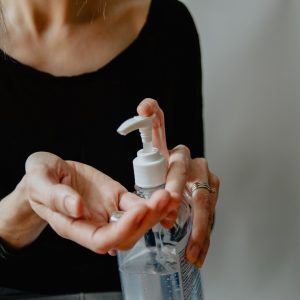SafetyCall International is a triple licensed health care practice by the boards of medicine, veterinary medicine, and pharmacy. Our mission is to make the world a safer place for our clients, their customers, animals, and pets. In order to support our animal health clients and pet owners alike will be continuing to share relevant information as it relates to animal health during these unprecedented times.
Lisa Martin, DVM
Associate Veterinarian

In today’s current conditions, hand sanitizers are everywhere—and for good reason, they help keep us safe. Unfortunately, we’ve been seeing misinformation about their danger to pets and wanted to set the record straight.
The reason hand-sanitizers kill germs is because of their high alcohol content, with some products containing up to 60-85% ethanol. Ethanol is also called ethyl alcohol and is the same alcohol that’s in beer and wine. Note, this is not the same ingredient in antifreeze—that’s one of the rumors. Antifreeze often contains ethylene glycol.
Ingesting large amounts of hand sanitizer may result in ethanol intoxication in dogs and cats, causing symptoms such as behavior changes, decreased co-ordination, depression, low blood sugar (especially in small and young pets), stomach upset, and even difficulty breathing. This most commonly occurs when the product is spilled on the floor and ingested by a pet or when a dog mistakes a bottle of sanitizer for a chew toy.
If enough is ingested to cause poisoning, the onset of symptoms can be very rapid, occurring within 30-90 minutes of exposure. If you find that your pet has ingested this product, we recommend that you contact your local veterinarian immediately or speak with Pet Poison Helpline for further assistance—time is of the essence!
When using hand sanitizer for yourself, once it has dried on your hands, there would be no danger to touching your pet, so snuggle away! Likewise, small licks of product from your hands is not expected to be harmful for most pets. Some animals may not like the scent, so don’t be alarmed if they turn their nose away before the scent has had time to wear off. Most importantly, keep the bottles out of reach of pets. We’ve found that dogs love to pull “goodies” like this out of purses and backpacks.
Dr. Lisa Martin joined SafetyCall International in 2019. She received a BS in Animal Science from the University of Tennessee and a Masters and Doctorate of Veterinary Medicine from the University of Missouri. After graduation Dr. Martin worked as an equine vet before moving to small animal emergency where she spent 5 years. For the last 6 years she has been working in small animal private practice. Dr. Martin live in Middle Tennessee with her partner James, dog Hanna, and cat Micah.


